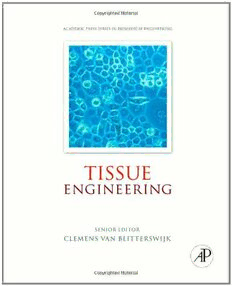
Tissue Engineering (Academic Press Series in Biomedical Engineering) PDF
777 Pages·2008·77.795 MB·English
Most books are stored in the elastic cloud where traffic is expensive. For this reason, we have a limit on daily download.
Preview Tissue Engineering (Academic Press Series in Biomedical Engineering)
Description:
Tissue engineering is an extremely important area. It generally involves the use of materials and cells with the goal of trying to understand tissue function and some day enabling virtually any tissue or organ on the body to be made de novo. To achieve this very important long-range objective requires research in many areas. This book... addresses many of these important topics, and the chapters provide a foundation for the understanding and development of the cell-based systems needed for tissue engineering.Dr. Robert S. LangerInstitute Professor at Massachusetts Institute of Technology, from his Foreword to this bookKey Features* Brings together fundamental knowledge in each of the key topics that those studying and working in tissue engineering need to understand and master* Surpasses other books that provide a collection of research and protocols, by presenting an insightful examination of the different aspects of tissue engineering* Its textbook approach enables readers to develop knowledge and understanding swiftly by introducing key topics and providing supporting analysis * Color illustrations, clear examples, case studies, chapter exercises plus frequent Classical and State of the Art Experiment overviews set topics in context for a wide range of readers* Meets the needs of a wide range of engineering and life sciences students, including biomedical engineers, chemical and process engineers, materials scientists, biologists and medical studentsTissue Engineering is a comprehensive introduction to the engineering and biological aspects of this critical subject. With contributions from internationally renowned authors, it provides a broad perspective on tissue engineering for students coming to the subject for the first time. Key topics covered include stem cells; morphogenesis and cellular signaling; the extracellular matrix; biocompatibility; scaffold design and fabrication; controlled release strategies; bioreactors; tissue engineering of skin, cartilage, bone and organ systems; and ethical issues. . Covers all the essentials from tissue homeostasis and biocompatibility to cardiovascular engineering and regulations. 22 chapters from internationally recognized authors, provide a comprehensive introduction for engineers and life scientists, including biomedical engineers, chemical and process engineers, materials scientists, biologists and medical students. Full colour throughout, with clear development of understanding through frequent examples, experimental approaches and the latest research and developments.
See more
The list of books you might like
Most books are stored in the elastic cloud where traffic is expensive. For this reason, we have a limit on daily download.
